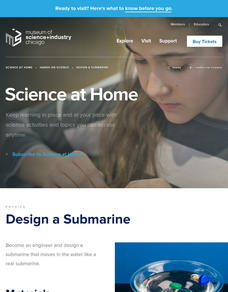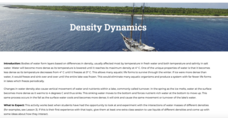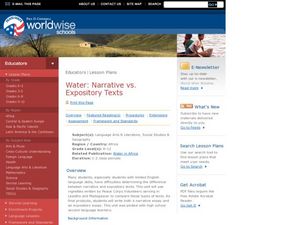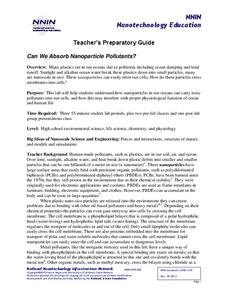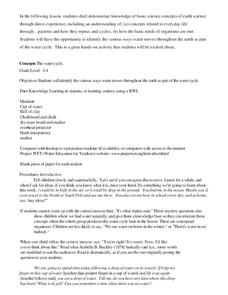Curated OER
Water Cycle
Second graders investigate the water cycle. In this water cycle instructional activity, 2nd graders discover how the water cycle effects erosion and weathering. Students create their own terrariums to view the water cycle. Students...
Curated OER
The Water Planet
Students use NASA photographs and hands-on activities to compare the amounts of land and water on our planet. They discover that the world has five oceans and that they cover seventy percent of Earth's surface. Students learn how this...
Curated OER
Ocean Life
Students explore the topics of ocean water salinity, ocean life zones, marine life classification, and ocean food chains. They observe demonstrations, conduct experiments, complete quizzes and handouts, and analyze key vocabulary.
Museum of Science
Design a Submarine
Don't just sink the boat. Using a closed container as a submarine, pupils experiment to see what to add to the container to make it float, sink to the bottom, and hover in the middle. After finding one option, learners see if they can...
Curated OER
Density Dynamics
Students set up working models demonstrating lake turnover and the formation of deep water masses in the oceans.
Curated OER
Water: Narrative vs. Expository Texts
A reading of vignettes written by Peace Corps Volunteers serving in Lesotho and Madagascar launches a study of the difference between narrative and expository texts. As final products, young writers craft both a narrative and an...
Curated OER
Oceanic Absorption- Oceanic Sequestration
Students examine the techniques that may be used to reduce carbon dioxide in the atmosphere. In this pollution lesson students simulate oceanic sequestration using chemistry.
Space Awareness
Ocean Acidification
Learn the science behind ocean acidification and its effects on ocean wildlife. Young scientists conduct a laboratory investigation that monitors the acidity level of water. While burning a candle, learners capture the carbon dioxide in...
National Nanotechnology Infrastructure Network
Can We Absorb Nanoparticle Pollutants?
Just because we can't see it doesn't mean it isn't there! A growing concern for environmental scientists is toxic nanoparticles in our air and water. Young scholars conduct an experiment to demonstrate how these particles can cross our...
Curated OER
Sea Water Freeze
Middle schoolers observe how salinity affects the time it takes water to freeze. They participate in an experiment to determine that ice is essentially salt-free whether formed from fresh or salt water
Curated OER
Salty Sea Water
Students conduct an experiment to find out if there is salt in the ocean. In this scientific inquiry lesson, students pour a cup of salt water onto an aluminum plate and observe the changes over a few days. Students complete an included...
Curated OER
Water Issues on Puerto Rico and Oahu: A Comparison of Two Islands
Fifth graders explore how the tow islands receive and use fresh water. They also address some of the threats to the fresh water supply on each island. Students explore the lesson objectives through water cycle models and experiments.
Curated OER
The Water Cycle
Learners access prior knowledge of the water cycle by completing a KWL. In this water cycle instructional activity, students follow the movement of water through the water cycle.
Curated OER
Ocean Murals
Students identify characteristics of water. They describe the process by which light decreases and pressure increases as water depth increases. They demonstrate the principle of water pressure in a small group experiment.
Curated OER
A Line Graph of the Ocean Floor
Students develop a spreadsheet and import the information into a line graph. In this spreadsheet and line graph activity, students develop a spreadsheet of ocean depths. They import the information into a word processed document. They...
Curated OER
Oceanic Absorption- Oceanic Sequestration
Students examine the different techniques that may be used to reduce carbon dioxide in the atmosphere. In this ocean pollution lesson students divide into groups and complete a lab to see how the ocean holds carbon dioxide.
Curated OER
Tsunami Simulation Experiment
Students examine the importance of tsunami warning systems. They read and discuss an article, conduct an experiment in a wave tank, calculate wave velocities of tsunamis, and identify what happens to tsunamis as they approach a shoreline.
Curated OER
Deep Blue: Exploring the Deep Ocean
Students examine landforms. In this social studies lesson, students bounce a beach ball around in order to discover that seventy percent of the Earth is covered in water. Students
US Environmental Protection Agency
Corals and Chemistry
After demonstrating the use of cabbage juice as a pH indicator, have your class experiment with their own breath, exhaling into the indicator, to show that carbon dioxide is acidic. As learners work, they also watch a video about coral...
NOAA
It All Runs Downhill
Examine how pollution makes its way into an ocean with help from a model watershed. Scholars use household items to recreate a mini-watershed, equipped with pollutants, that when mixed with rain drain into a model's body of water. After...
NOAA
Wet Maps
How do oceanographers make maps under water? Junior explorers discover the technologies and processes involved in creating bathymetric maps in part three of a five-part series designed for fifth- and sixth-grade pupils. The lesson...
Curated OER
Earth: The Water Planet
Students elicit data on the water cycle, ocean topography, and island formation in this six lesson unit. The ocean floor and the properties of water are examined through a variety of discussions and hands-on experiments.
Curated OER
Ocean Currents
Students determine how water and wind affect ocean currents. In this science investigation lesson, students follow the provided steps to enable them to consider how explorers may have used ocean currents to their advantage.
Curated OER
Water Pressure
Students spend time examining the concept of water pressure. In groups, they research the amount of air pressure that is felt at different levels above sea level. Using a calculator, they calculate the water pressure given different...





